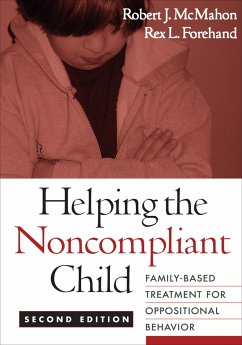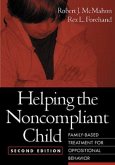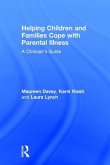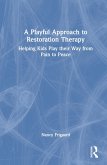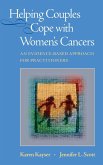This popular treatment manual presents an empirically validated program for teaching parents to manage noncompliance in 3- to 8-year-olds. Practitioners are provided with step-by-step guidelines for child and family assessment, detailed descriptions of parent training procedures, effective adjunctive treatment strategies, and complete protocols for conducting and evaluating the program. Nationally recognized as a best practice for treating conduct problems, the program is supported by a substantial body of treatment research.
Hinweis: Dieser Artikel kann nur an eine deutsche Lieferadresse ausgeliefert werden.
Hinweis: Dieser Artikel kann nur an eine deutsche Lieferadresse ausgeliefert werden.
"This exceptional second edition by two of the leading experts in the field provides both clinicians and researchers with a rich array of information. Like its predecessor, this book is solidly grounded in the scientific research on childhood oppositional behavior and parent/family training approaches. Practitioners will find a wealth of detailed advice on how to work with parents on improving relations with their children while reducing family conflict. Clinical scientists will likewise appreciate the vast amount of research summarized on the nature of defiant and aggressive behavior, the role of parent-child interactions and family context in its generation and maintenance, and the efficacy of parent training in behavior management skills for its reduction if not elimination. Anyone interested in empirically based parent training for the management of difficult children will find this book 'must' reading for staying abreast of the state of the art."--Russell A. Barkley, PhD, College of Health Professions, Medical University of South Carolina"This classic text is a definite 'must have' for practitioners and researchers working with children with conduct problems and their families. The extensively revised and updated new edition attests to the ongoing development of this truly evidence-based parenting intervention. The authors blend scientific and theoretical justification with detailed descriptions of the program, including attention to process issues. I thoroughly recommend this excellent book."--Matthew R. Sanders, PhD, Director, Parenting and Family Support Centre, The University of Queensland, Australia"This compelling second edition exemplifies how developmental and outcome data can and should be used to inform the continuous refinement of a powerful intervention. A pleasure to read, the volume is grounded in 20 years of meticulous research. The rationale for each clinical technique is detailed, precise steps are outlined for implementation, and useful case examples are provided. Each page provides further evidence that these authors know what they are doing and can serve as most effective guides for novice practitioners, students, and researchers. One of the best books on family interventions that I have read."--John B. Reid, PhD, Oregon Social Learning Center"This impressive work is a highlight of the rich, two-decade collaboration between McMahon and Forehand. Their program is one of our field's most venerable parent training interventions, with roots in the remarkable insights of Constance Hanf. This fine book makes the program accessible to clinicians and is also valuable as a reference for researchers. Clinicians will appreciate the clear language and step-by-step guidance through program procedures, as well as the parent handouts and other supporting materials. Researchers will appreciate the summary and update of relevant empirical work, including thoughtful self-critique and directions for the future. The book is an important accomplishment for these two highly regarded investigators and an essential addition to any library of evidence-based treatments."--John R. Weisz, PhD, Department of Psychology, University of California, Los Angeles

